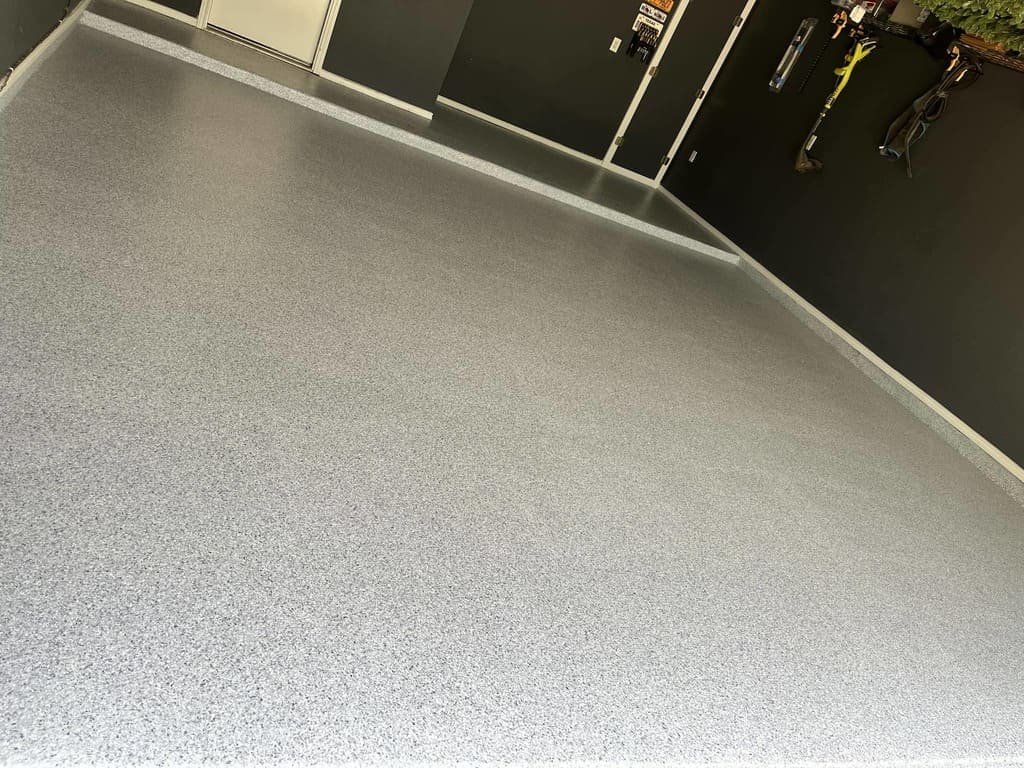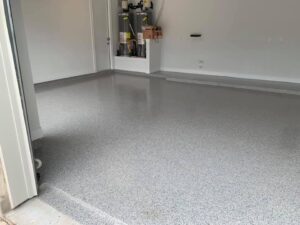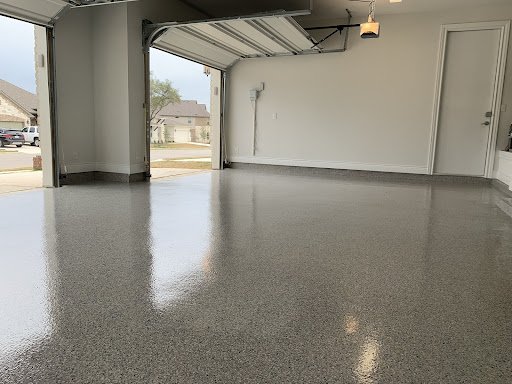What Is Epoxy Flooring, and What Are the Advantages of Epoxy Garage Floor Installation?
Epoxy flooring is a super tough type of floor coating made from resin and a hardener. When these two ingredients are mixed, they react chemically to form a durable, plastic-like material that adheres exceptionally well to almost any concrete surface. Here’s a detailed look at the application process:
- Surface Preparation: The first step is a thorough cleaning. We will diamond grind the area to profile concrete.
- Applying a Epoxy & Chips: Once the floor is clean and dry, a 2 part component, high build, pigmented epoxy binder is applied then immediately vinyl chip flakes are broadcasted with 100% chip coverage.
- Sealing the Floor: Finally, a topcoat, extended-life polyaspartic top coat sealer is applied. This seals the epoxy, adding extra protection against wear and tear.
These steps transform any garage into a clean, professional-looking space. The sleek, shiny surface is visually appealing and highly functional, underscoring the significant advantages of epoxy garage floors.

The gray epoxy floor transformed the garage into a stylish space.
What’s the Benefit of an Epoxy Garage Floor?
Epoxy garage floors are about keeping things low-maintenance and looking great for years. This brings us to the question: What’s the benefit of an epoxy garage floor? Firstly, they’re super tough, so they can handle a lot of wear and tear without showing it. Whether you’re dealing with oil spills, chemical leaks, or just the usual dirt and grime, epoxy flooring shrugs it off with ease. Their smooth, seamless finish means dirt and dust don’t have anywhere to hide, making cleaning a breeze. So, why do you epoxy the garage floor? The benefits speak for themselves – durability, aesthetics, protection, easy maintenance, and safety all rolled into one fantastic flooring solution! It’s perfect for garages and workshops where spills and messes are part of the day.
Breaking Down the Cost of Epoxy Garage Floor Installation
Considering epoxy for your garage floor is a great choice, but it’s essential to understand what goes into the cost. Here’s a deeper dive into the factors that can influence the final cost of an epoxy garage floor:
Square Footage
- Size Matters: Generally, larger garages benefit from a lower cost per square foot due to economies of scale in materials and labor. However, the overall expense increases as more square footage requires more material and more time to apply.
Epoxy Type and Quality
- Material Choices: The type of epoxy you choose significantly impacts cost. Standard epoxy is more affordable but might not have the durability or aesthetic appeal of high-grade options with enhanced colors, finishes, and longevity.
Surface Preparation Requirements
- Prep Work: The condition of your existing garage floor can add to the epoxy garage floor cost. Floors with cracks, uneven areas, or previous coatings need extensive prep work like filling, grinding, or sanding before the epoxy can be applied properly.
Labor Costs
- Professional Installation: The contractor’s expertise and the job’s complexity will influence labor costs. More intricate designs and larger areas require skilled professionals, potentially increasing the price.
Additional Factors
- Geographical Location: Labor and material costs can vary significantly depending on your location.
- Customization: Adding colors, patterns, or textures to your epoxy floor can also affect the overall cost of the epoxy garage floor. Custom designs, or the integration of logos and decorative details, are usually more expensive.
- Maintenance Costs: While epoxy flooring is low maintenance, long-term care and occasional resealing can factor into its overall cost-effectiveness.

The garage’s ambiance is brightened with blue epoxy flooring.
Epoxy Garage Floor Pros and Cons
Epoxy flooring is a popular choice for garages, and it’s packed with benefits—but it’s not without its drawbacks. So, is epoxy good for the garage floor or not? Here’s a balanced look at both the upsides and the challenges:
Pros of Epoxy Garage Floors
- Durability and Longevity: One of the biggest advantages of an epoxy garage floor is its toughness. It’s built to withstand heavy traffic and can last decades without cracking or peeling.
- Resistance to Stains, Chemicals, and Impact: This flooring is a champion against stains from oil, chemicals, and other common garage spills. It’s also tough enough to handle dropped tools and other impacts without damage.
- Easy Cleaning and Maintenance: Keeping an epoxy floor looking great is straightforward – a quick sweep and an occasional mop are all it takes to keep it spotless.
- Aesthetic Appeal and Customization Options: Another epoxy garage floor benefit is that epoxy comes in a variety of colors and patterns, so you can easily customize your garage floor to match your home’s style. Whether you want a sleek, single-color look or a unique pattern, epoxy makes it possible.
- Enhanced Safety Features: To make your garage safer and prevent slips and falls, you can opt for non-slip additives in the epoxy finish.
- Increase in Property Value: A well-installed epoxy floor can increase your home’s appeal and value, making it a smart investment. This boost in attractiveness is just one of the epoxy garage floor benefits.
Cons of Epoxy Garage Floors
- Installation Requirements: Installing epoxy flooring requires precision. The concrete must be properly prepared, the epoxy precisely mixed, and the application timed right for the best results. This often means hiring professionals, which adds to the cost of epoxy garage floors.
- Slippery When Wet: Although non-slip options are available, standard epoxy can be quite slick when it’s wet. This can be a hazard if it is not addressed during the installation process.
- Potential for Yellowing: Over time, exposure to sunlight can cause the epoxy to turn yellow and lose its vibrant look. Consider this if your garage gets a lot of direct sunlight, but it’s just a minor concern compared to the numerous other epoxy garage floor benefits.
- Maintenance Needs: While generally low-maintenance, epoxy floors do need to be resealed periodically to maintain their resistance to chemicals and stains. The exact frequency depends on the level of traffic and use.
Epoxy garage floors definitely bring a lot to the table for homeowners sprucing up their garage game. Overall, weighing the epoxy garage floor’s pros and cons is key before diving in. But with attention to detail, they can be a solid investment that keeps your garage looking sharp for years to come.

The garage’s gray epoxy floor stood out against white walls.
Is Epoxy Good for Your Garage Floor?
Epoxy garage flooring is a solid choice if you want a floor that boosts the safety and look of your garage. Curious about whether epoxy is good for your garage floor or why you should even consider it? For a smooth process and top-notch results, hire skilled garage floor epoxy contractors. Suncoat of Texas is not just any professionals; we are a family-operated business that brings over 20 years of combined experience in the construction and decorative concrete industry to your project.
Our installers aren’t just part-time contractors; they are full-time employees who take immense pride in their work, ensuring each job is done meticulously and stands the test of time. This level of dedication and expertise guarantees that you will experience all the advantages of an epoxy garage floor. We cover a broad area, including:
- Austin, TX, and the surrounding area up to 100 miles
- Round Rock, TX
- Georgetown, TX
Thinking, why should you epoxy the garage floor? Team up with Suncoat of Texas, and we’ll tell you! Kick-start your garage transformation with a durable and good-looking epoxy floor today!
FAQ: Benefits of Epoxy Garage Floors
1. How much value does an epoxy garage floor add?
While it’s hard to quantify the exact increase in dollar terms as it can vary based on the market and the home’s existing conditions, realtors often highlight epoxy flooring as a desirable upgrade that appeals to potential buyers.
2. Can epoxy be applied to any type of garage floor surface?
Epoxy can be applied to most garage floor surfaces, but proper surface preparation is key to a successful application. Concrete floors need to be clean and free of moisture, grease, and previous coatings.
3. Can epoxy garage floors be customized with different colors or designs?
Absolutely! One of the major advantages of epoxy flooring is its versatility in terms of aesthetics. Epoxy can be customized with a wide range of colors and patterns, including metallic finishes, flakes, and even intricate designs.
4. How long does it take to install an epoxy garage floor?
The installation time for an epoxy garage floor can vary significantly depending on the size of the garage and the specific requirements of the job. Generally, the process can take anywhere from 2 to 5 days.
5. How long will an epoxy garage floor last?
An epoxy garage floor can last anywhere from 10 to 20 years or more, depending on the quality of the materials used, the condition of the underlying floor, and how well the floor is maintained after installation.

